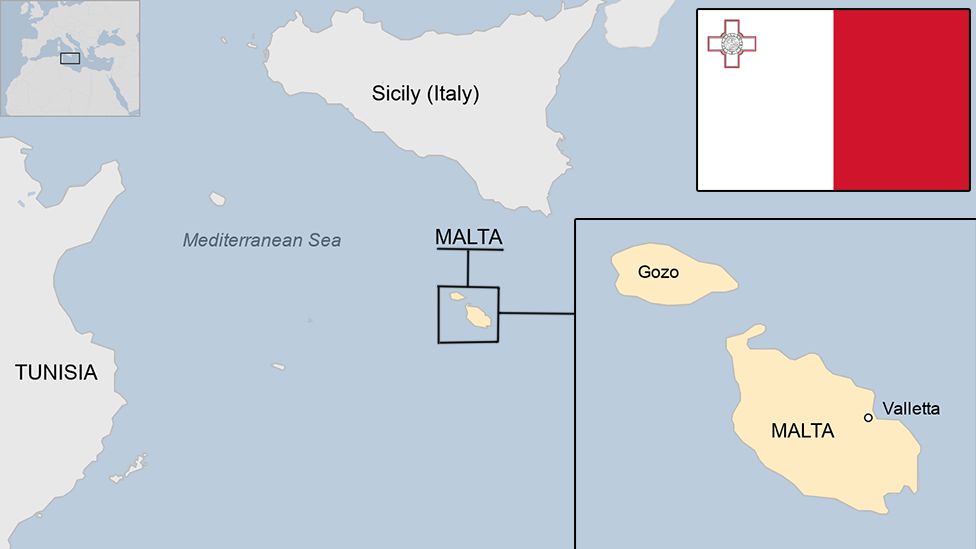Malta country profile
- Published

The Maltese archipelago has a history of colonial control spanning centuries.
Located south of the Italian island of Sicily between Europe and North Africa, the islands have been occupied by Phoenicians, Greeks, Romans, Arabs, the Knights of Malta, and latterly France and Britain.
Independence from Britain was achieved in 1964, after the Maltese people were awarded the George Cross for defending the crucial military bases there during World War Two.
Over the centuries, Malta's strategic position has fostered its development as an important trading post, and it remains a leading centre for container and freight transhipment.
Malta is a popular holiday destination, and tourism is the nation's main source of income.
- Read more country profiles - Profiles by BBC Monitoring
REPUBLIC OF MALTA: FACTS
- Capital: Valletta
- Area: 316 sq km
- Population: 519,500 million
- Languages: Maltese, English
- Life expectancy: 80 years (men) 84 years (women)
LEADERS
President: George Vella
George Vella was elected unopposed as Malta's tenth president in April 2019 in a parliamentary vote.
He is a veteran Labour Party politician, who has served variously as deputy prime minister and foreign minister.
The presidency is a largely symbolic post.
Prime Minister: Robert Abela
Robert Abela took over as prime minister and Labour Party leader in January 2020, when his predecessor Joseph Muscat resigned in the fallout from the murder of investigative journalist Daphne Caruana Galizia.
In March 2022, the ruling Labour party, led by Abela, won its third successive election.
Muscat had been credited with boosting Malta's economy, but criticised for failing to rein in the corruption that Ms Caruana Galizia was investigating when she was killed by a car bomb in 2017.
Muscat's handling of the murder inquiry caused widespread anger and he was accused of protecting allies implicated in the investigation, which he denies.
MEDIA
Many of Malta's newspapers and broadcasters have strong political affiliations. Dailies and weeklies appear in Maltese and English.
Maltese radio began in the mid-1930s, partly to counter Fascist propaganda broadcasts from Italy.
TIMELINE
Some key dates in Malta's history:
5200BC - Arrival of European Neolithic settlers, mainly from Sicily. A significant prehistoric Neolithic culture emerges marked by the building of Megalithic temples such as Gigantija, Hagar Qim, Mnajdra and Ta Hagrat between 3600-2500BC.
800-700BC - Phoenicians and subsequently their successors the Carthaginians colonise the islands, using the archipelago as a base from which to expand their trade across the Mediterranean.
216BC - Rome conquers the islands, which then become part of the Roman empire from 1st-4th Centuries.
4th-9th Centuries - Islands under Byzantine rule.
870-1091 - Arab invasion and occupation of the islands.
1091 - Normans conquer the islands, which then become part of the Kingdom of Sicily.
1530 - Holy Roman Emperor Charles V gives the islands to the Order of Knights of the Hospital of St John of Jerusalem in perpetual lease - in return for an annual fee of one Maltese falcon.
1551 - Unsuccessful Ottoman attempt to invade Malta
1565 - Great Siege of Malta: the climax of an escalating contest during the 16th Century between allied Christian states and and the Islamic Ottoman Empire for control of the Mediterranean. The Ottoman Sultan, Suleiman the Magnificent, sends a 40,000-strong force to besiege the outnumbered defenders on Malta. The four-month attempt ends in failure for the Ottomans.
1798 - French forces capture Malta from the Knights of Malta,
1800 - French troops surrender to British forces after a Royal Navy blockade.
1814 - The Treaty of Vienna ends the Napoleonic Wars, and grants Malta as a crown colony to Britain. Along with Gibraltar, Malta becomes Britain's key naval base in the Mediterranean.
1939-1945 - Malta suffers heavy bombing by German and Italian air forces targeting Allied bases. King George VI awards colony the George Cross - Britain's highest civilian decoration - for heroism.
1947 - Self-government granted.
1964-71 - Independence granted. Conservative Nationalist Party pursues pro-Western policies.
1971 - Dom Mintoff's Labour Party takes power, and reorients Malta towards Libya and the Communist bloc.
1974 - Malta becomes republic.
1979 - Closure of last British military base.
1987 - Victory of Nationalist Party marks move toward European integration, three years after Dom Mintoff resigns.
2004 May - Malta is one of 10 new states to join the EU.
2008 - Malta adopts the euro.
2011 - Maltese parliament passes law allowing divorce after the move is approved in a referendum. The overwhelmingly Catholic country was the last in Europe to maintain a divorce ban.
2017 - Reporter Daphne Caruana Galizia is killed by a car bomb after campaigning against corruption in high places. Mass protests in Malta lead to pressure on the authorities to allow an independent public inquiry.
2020 - Labour Prime Minister Joseph Muscat quits in a political scandal over the murder of investigative journalist Daphne Caruana Galizia.
Related Topics
- Published4 October 2023
- Published28 June 2023
- Published13 September 2023
- Published24 July 2023
- Published9 January